BEIJING -- The dominant political narrative in China today is one of resounding triumph: targets for economic growth achieved, rival countries overtaken, an Olympics successfully hosted. Yet in the telling of a philosophy professor at a prominent Shanghai university, many of these supposed victories have proven hollow for the Chinese people.
"On the surface we've achieved the goals, but no one is happy," the professor, who goes by the English name Luke, told The WorldPost. "There's no love, no hope. For more than 100 years we Chinese have been trying to catch up with Western countries. We want science, technology and military power. But the most important thing is the soul of the culture. The mind is based on the soul, and we've lost our souls."
Luke, who asked that his Chinese name not be used because he worships in one of China's many illegal underground churches, isn't alone in his concern for the state of the country's soul. As a convert to Christianity, he is one of a growing number of Chinese who are turning to a variety of faiths as they grapple with what they say is a gaping moral abyss in society.
"People today are afraid of showing love, afraid of being laughed at by other people," Luke lamented. "That spells the end of society."
China’s Christian population has been expanding at rates that rival its awe-inspiring GDP growth, with one scholar predicting that by 2030 China will be home to more Christians than any other country on earth. Many Chinese are also seeking solace in traditional belief systems such as Buddhism and Confucianism, in what they describe as a reaction to China's transformation from a poor agricultural society to an urban-industrial powerhouse. Yet others have found spiritual comfort in a return to Communist ideology and view Mao Zedong, former chairman of the Chinese Communist Party, as a savior who will help them revive communal bonds.
"Many people perceive a moral and spiritual crisis in China today," wrote the editors of the Review of Religion and Chinese Society, a new academic journal dissecting China's religious revival. "The foundation of a better future for China is believed by many people to be a spiritual renewal."
The topics of faith and the state of one's soul have been on the backburner for many Chinese since 1978, when leader Deng Xiaoping turned China away from the pursuit of a Communist utopia and toward the construction of a modern market economy.
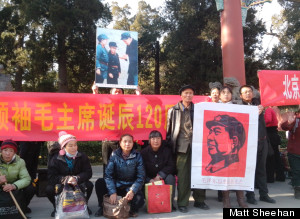
Deng's sober and pragmatic push for economic reform came in response to Mao's Cultural Revolution, a movement from 1966 to 1976 to enforce Mao's version of Communism and purge China of any competing ideologies, everything from capitalism to Confucianism. Fanatical believers in the movement desecrated the Buddhist and Confucian temples that had served as the bedrock of Chinese spirituality for thousands of years. Meanwhile, Mao issued ideological manifestos and presided over mass public rallies that elevated him to God-like status in the hearts of many.
The Cultural Revolution robbed China of a decade of development, demonized traditional Chinese religious practices -- and, in the process, discredited Maoism for millions. Since then, 35 years of economic reform have more than quintupled both rural and urban income levels. But China and its people are currently at the "lowest of lows," according to Luke.
Asked to identify the low point for Chinese society, Luke and many other Chinese point to Oct. 13, 2011. That was the day Wang Yue, the 2-year-old daughter of migrant shopkeepers in southern China, wandered into an alley behind her father's store and was run over by two vehicles. For seven minutes she lay crying and bleeding in the street as 18 pedestrians, one by one, delicately made their way around her body without doing anything to help. It wasn't until a woman scavenging for trash came upon her mangled body that Wang was taken to a hospital, where she died eight days later.
The entire event was captured on closed-circuit television, and this bone-chilling display of indifference to human suffering was the second most viewed video of the year in China. What became known as the "little Yue Yue incident" stirred up a wave of soul-searching and hand-wringing among Chinese people, and strengthened Luke's conviction that China needs God's grace.
DABBLING IN FAITH
Luke's personal journey to Christianity had already begun a few years earlier after he made a painful decision facing hundreds of millions of Chinese: He left behind his wife and young child, moving to another province in pursuit of a better job. The coveted position as a professor of philosophy at a prestigious university came at the cost of personal isolation and a deteriorating marriage.
Luke first sought solace in the practice of Buddhism, but said he quickly grew disillusioned with the monks' emphasis on hierarchy and ceremonial gifts.
"I took on a Buddhist name, read the books, and for two months prayed every day, but I didn't find peace," Luke recalled.
He then turned toward the western tradition of Christianity, which he'd first encountered several years earlier in philosophy courses. After a brief period of time attending the state-sanctioned "Three-Self" churches, Luke found a loving community and a sense of belonging in an underground "house church."
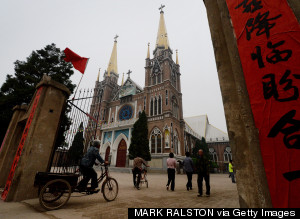
"The relationship between the brothers and sisters is full of love, and everyone can speak," Luke said. "It's not like the Three-Self churches where only the priest can speak and everyone else sits there listening."
He said the sense of purpose and humility that came with his conversion have transformed his life and marriage, as well as the way he sees his country and culture. Luke believes that Christianity can also help China solve its myriad social woes and put an end to the spiritual drift that followed the Cultural Revolution.
"The culture was and still is destroyed," Luke said. "The most important things for Chinese people have been demolished, and what happened to little Yue Yue is related to the destruction of that meaning."
REVERTING TO RED
Each Sunday morning, while Luke is worshipping the Christian God in a house church, 54-year-old Fan Huiming is attending her own services in Jingshan Park at the very center of Beijing. She plays the role of congregant, preacher and choir member, putting all her heart into singing the praise of a different deity: Chairman Mao Zedong.
"It doesn't matter whether you look at his leadership, his art, his poems, his philosophy, his calligraphy ... In my heart he's simply a perfect person," Fan said. "As someone who truly loves Chairman Mao, as a true Marxist-Leninist, I will never change my faith."
Fan's faith is a result of her birth into unique historical circumstances. Just as Mao's Red Army was closing in on Beijing and preparing to declare the founding of the People's Republic of China in the fall of 1949, Fan was born in the capital to parents who were officials in Chiang Kai-Shek's defeated Nationalist government. Many in her family were able to flee to Taiwan, but Fan's pregnant mother couldn't make the journey, and she gave birth to Fan amid the tumult of the new Communist order.
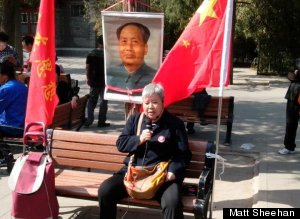
Her status as the child of Nationalists -- Mao's sworn enemies -- would dog Fan through much of her life. Despite a fanatical devotion to Mao and a venomous hatred for the Nationalists, she said she has never been allowed to join the Chinese Communist Party. But what she lacked in credentials she made up for in zeal. Throughout the Cultural Revolution she collected Mao memorabilia, memorized his speeches and struggled against capitalists and all perceived enemies of the proletariat class.
Thirty-eight years after Mao's death, she still gathers with fellow Mao devotees in Jingshan Park every Sunday morning to sing red songs, hold up Mao's portrait and lecture passersby through a microphone. A sturdy and serious woman, Fan shuns the "red" dancing that many of her fellow 60-somethings enjoy, choosing instead to challenge people who seek to tarnish Mao's image.
"Nowadays you have so many people attacking Chairman Mao," Fan fumed. "I'll just come right out and say it: Those people are taking money from the American government."
Her impassioned defense of Mao's legacy stems from rosy childhood memories of the chairman's reign, when everyday life was imbued with a kind of communal spirituality, she said.
"Mao Zedong's era was about saving people's souls, about teaching people to strive for something higher," Fan said. "People from that time really put all their heart and soul into building this country and into following Mao Zedong."
Fan said she remembers a time when no one locked their doors at night, and maintains that the crimes committed in a single day in 2013 surpassed those committed over the entirety of Mao's 27-year reign. In her mind, the Cultural Revolution was a necessary bump on the road to a Communist utopia; where things really turned sour was with economic reform, she said.
"When Deng Xiaoping first brought up this idea of letting some people get rich first, it was just wrong, and it completely violated the main principle of the Communist movement," Fan said emphatically. "Everything is going in the direction of privatization. We're missing the concept of doing things for the common good, for the country, and to serve the people."
In the early 1980s she wrote a letter to Deng expressing this sentiment. She was rewarded not with a reply from China's leader, but with an ominous visit from state security agents.
Yet decades into the changes that have catapulted China toward superpower status, she is still a true believer in the principles of her youth.
"We've been through so much, and now only Mao Zedong Thought can save China," Fan said. "After so many years of reform and opening, people are just more isolated and hopeless."
Adoration for Mao is concentrated heaviest among people who came of age during the Cultural Revolution, but it has also spilled over into broader society during moments of international tension. During anti-Japan protests in recent years, patriotic demonstrators frequently carried portraits of the former leader and chanted, "Long live Chairman Mao!"
For Fan and her cohorts, an absolute faith in Mao has morphed the man into something of an omniscient and all-powerful God whose spirit still permeates the world. Following devastating tornadoes in the American Midwest during the summer of 2013, she wrote in a text message: "The spirit of Chairman Mao Zedong is always protecting the people he loves, the people of the world ... If the American government perpetrates evil, then the heavens will react! Bigger tornadoes, bigger volcanic eruptions!"
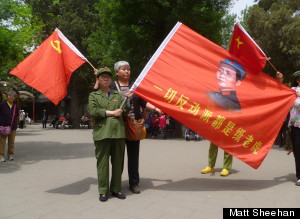
Her vision may be one of fire and brimstone, but ever since retiring from her job in the long-distance bus industry, Fan said she has been content engaging in more mundane acts of revolution by bringing her message to the people of Jingshan Park every Sunday. The one disappointment for Fan has been her son's indifference to Mao's message.
"To tell the truth, when I talk to my son about this, he just doesn't want to get involved in politics," Fan said while running her thumb over a Cultural Revolution-era Mao button. "He always tells me, 'That's all behind us, don't always bring it up.' But in my heart that really makes me sad.
"In China, society's influence is stronger than the family's. No matter what kind of education my son gets at home, as soon as he goes out the door he'll run into that kind of pollution from society."
BUDDHISM AS 'SOCIAL EDUCATION'
In the central Chinese city of Xi'an, home to the ancient terracotta warriors, Samantha Yang has had better luck in sharing her newfound spirituality with her son, Leo. Yang runs her own English training school in Xi'an, and the financial pressures from the school, combined with her struggles as a single mom, brought her to Buddhism.
Yang grew up with no strong spiritual influences in her life, and left her hometown of Xi'an after college to seek employment in the southern island province of Hainan. After working as a saleswoman for a cosmetics company, she founded her own English-language training school in 2002 for children back in her hometown.
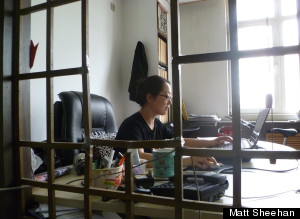
"For a long time I thought I was a superwoman," Yang recalled. "I thought I could do anything.
"When I first started the school, there was just so much pressure in my life. In 2006 we ran a summer program and lost 200,000 yuan [about $25,000], which was really hard to deal with. I tried reading some philosophy and even looked at those Chicken Soup books, but none of it was for me."
Yang's spiritual breakthrough came when a friend brought her to a Buddhist monastery in a village outside of Xi'an. During some of her first meals at the monastery she was captivated by the practitioners' refusal to waste an ounce of food. When she left her mostly-eaten watermelon slices on a plate, the elderly woman collecting dishes chewed the last remaining hint of pink off Yang's white watermelon rinds.
That humility and simplicity won Yang over. She said she now practices Buddhism not only because it brings her peace, but because she views it as a "social education system" for Chinese society. The religion advocates a serenity and humility that stand in stark contrast to many people's frenzied desire to accumulate wealth at any cost. Its appeal has fueled what many say is a Buddhist revival in China, with surveys suggesting that up to one-third of Chinese now consider themselves Buddhists.
In Yang's assessment, traditional Chinese culture has been eroding since 1919, when nationalist student demonstrations known as the May Fourth Movement blamed China's Confucian tradition for the country's domination by colonial powers. She sees those attacks on China's ancient heritage as having destroyed something fundamental to the culture.
Yang and her son have approached Buddhism in different ways. While Leo rarely visits the monastery, Yang has noticed a new equanimity in her son despite the pressure-cooker environment in Chinese high schools. Yang has taken up chanting meditation at the monastery as a way to clear her mind of the "wild luxury ideas" that she feels permeate contemporary Chinese society.
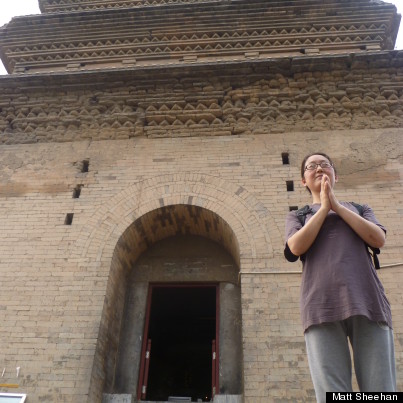
Searching for the root of her own spiritual journey, Yang looks back to her grandmother, a peasant who never abandoned China's diverse array of folk religions.
"My grandmother was very open to belief," Yang said. "She was willing to worship almost anything, any God she thought had power. I think maybe she was a seed for my faith."
The simplicity and community Yang has found at her monastery give her hope that China can be saved from what she describes as its current state of ethical anarchy. Her faith has taken a different form from that of Luke and Fan, but in searching for a moral compass to navigate the tumult of modern China, they have all forged their own path toward personal salvation and social redemption.
"The fate of Western society is comedy, but in China it's tragedy: hopeless, aimless, meaningless," Luke said. "The fate of China can be changed to comedy."
